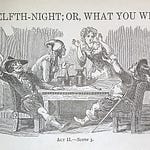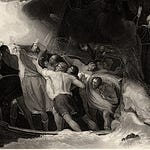When I wasn’t with a couple of my 39 cousins, and it was a great thing for me that I had so many, I was a pretty shy kid, not that it takes much shyness in a teenage boy to be nervous about talking to girls. For some reason we always feel a bit awkward and foolish around them, as if we’d grown too gangly for our shirt and trousers and our wrists and ankles were hanging out. That’s if the miraculous Year of Much Growing has come upon us. If it hasn’t yet, and we have to look up at the girl, well, we don’t look up but aside, or we play the jester, since we’re not going to be taken seriously anyway. We’re in no doubt about ourselves. We know we’re not good enough, no matter how loudly some boys may boast.
Faint heart never won fair lady, they used to say, and that’s what was on the mind of Edmund Spenser, the author of a passage of several stanzas that will serve for our Poem of the Week. Of course, we can’t do the entire Faerie Queene, all 34,000+ lines of it! But I’ve chosen a part of one of my favorite scenes in the poem. The brave young Sir Scudamour — his name means Shield of Love, that is, Cupid’s Shield — has been asked by his fellow travelers along the road to tell them the story of how he won the hand of the beautiful lady Amoret. Spenser was like most medieval and Renaissance poets, always in one way or another writing about love. This time, it’s about the natural and hallowed love between man and woman, male and female, that really does make the world go round. Amoret is one of twin baby girls born to a nymph of Diana, the goddess of chastity, and one day when Venus was searching hither and yon for that wayward boy, Cupid, he of the unfailing arrows and the mischief-making eye, she decided she’d better check out the woods where Diana dwelt, with the other virgin nymphs dedicated to the hunt. After all, she says, Cupid’s a pretty boy, and could easily disguise himself as one of them!
So Venus and Diana, here the goddesses of married love and virginity, settle their differences and go out looking for the boy together, and that’s when they find two baby girls, newborn, beside their unconscious mother. Diana takes one of them and raises her up in virginity; Venus takes the other, and names her Amoret, or Amoretta — literally, Little Cupid, feminine gender. Amoret, destined for marriage, is trained in womanhood. And that’s where Scudamour has to go, to the Temple of Venus, to win for himself in battle the Shield of Love, and to lead Amoret away.
All kinds of creatures get in his way, some of them beautiful but deceitful, some of them quite the monsters, but all of them — Doubt, Danger, Delay, and so on — figuring some stage in the course of courtship, some bridge to cross, some door to break open, some fear to overcome. He presses on, he enters the temple itself, and finally he sees a “bevy of fair ladies” seated at the foot of Venus’ statue. Seven of them represent what Spenser wants to highlight as the loveliest of womanly virtues, and the eighth, the loveliest person of them all, is Amoret herself, who is the sum and summit of all.
It is a holy place. Should he rob the church? Or is this not a church meant to be robbed? We should have a fine sense for Spenser’s understated humor. Who, if not Cupid’s man, should win Venus’ woman? Only here is apparent church-robbing no sacrilege, because the temple is dedicated to no other than the wonder that each sex should have for the other, and to the exalted beauty of the virtuous woman, she here meant for union with man, to fulfill that first and most joyous command of God. But, all you readers who were boys once, what would you do? And all you readers who were girls once, how would you respond? The old dance, that’s what it is, and may God ever bless it!
Whilst thus I spake, behold with happy eye I spied, where at the Idol's feet apart A bevy of fair damsels close did lie, Waiting when as the Anthem should be sung on high. The first of them did seem of riper years And graver countenance than all the rest; Yet all the rest were eke her equal peers, Yet unto her obeyed all the best. Her name was Womanhood, that she expressed By her sad semblant and demeanor wise: For steadfast still her eyes did fixed rest, Nor roved at random after gazer's guise, Whose luring baits oftimes do heedless hearts entice. And next to her sat goodly Shamefastness, Nor ever durst her eyes from ground uprear, Nor ever once did look up from her dess, As if some blame of evil she did fear, That in her cheeks made roses oft appear: And her against sweet Cheerfulness was placed, Whose eyes like twinkling stars in evening clear Were decked with smiles, that all sad humors chased, And darted forth delights, the which her goodly graced. And next to her sat sober Modesty, Holding her hand upon her gentle heart; And her against sat comely Courtesy, That unto every person knew her part; And her before was seated overthwart Soft Silence, and submiss Obedience, Both linked together never to dispart, Both gifts of God not gotten but from thence, Both garlands of his Saints against their foes' offense. Thus sat they all around in seemly rate: And in the midst of them a goodly maid, Even in the lap of Womanhood there sat, The which was all in lily white arrayed, With silver streams amongst the linen strayed; Like to the Morn, when first her shining face Hath to the gloomy world itself bewrayed, That same was fairest Amoret in place, Shining with beauty's light, and heavenly virtues' grace. Whom soon as I beheld, my heart gan throb, And wade in doubt, what best were to be done: For sacrilege me seemed the Church to rob, And folly seemed to leave the thing undone, Which with so strong attempt I had begun. Then shaking off all doubt and shamefast fear, Which Lady's love I heard had never won Mongst men of worth, I to her stepped near, And by the lily hand her labored up to rear. Thereat that foremost matron me did blame, And sharp rebuke, for being overbold; Saying it was to Knight unseemly shame Upon a recluse Virgin to lay hold, That unto Venus' services was sold. To whom I thus, "Nay but it fitteth best For Cupid's man with Venus' maid to hold, For ill your goddess' services are dressed By virgins, and her sacrifices let to rest." With that my shield I forth to her did show, Which all that while I closely had concealed; On which when Cupid with his killing bow And cruel shafts emblazoned she beheld, At sight thereof she was with terror quelled, And said no more: but I which all that while The pledge of faith, her hand engaged held, Like wary Hind within the weedy soil, For no entreaty would forgo so glorious spoil. And evermore upon the Goddess' face Mine eye was fixed, for fear of her offense: Whom when I saw with amiable grace To laugh at me, and favor my pretense, I was emboldened with more confidence; And nought for niceness nor for envy sparing, In presence of them all forth led her thence: All looking on, and like astonished staring, Yet to lay hand on her, not one of all them daring.
Listen to this episode with a 7-day free trial
Subscribe to Word & Song by Anthony Esolen to listen to this post and get 7 days of free access to the full post archives.














